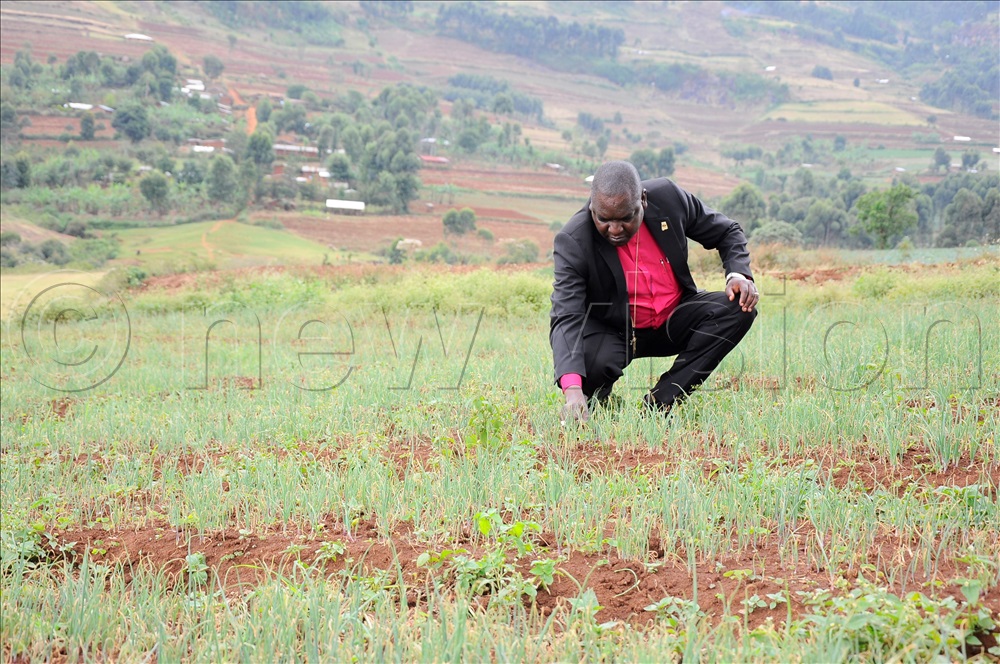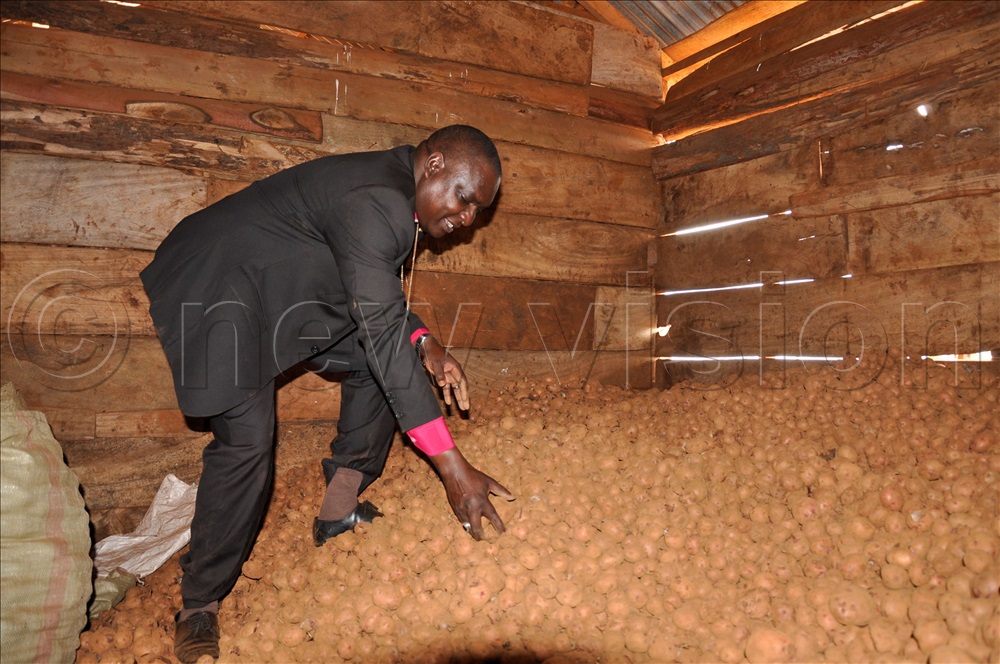By Umar Nsubuga
For the eighth year running, Vision Group, together with the Embassy of the Netherlands, KLM Airlines, dfcu Bank and Koudjis Animal Nutrition, is running the Best Farmers’ competition. The 2023 competition runs from March to November, with the awards in December. Every week, Visio n Group platforms will publish profiles of the farmers. Winners will walk away with sh150m and a fully paid-for trip to the Netherlands.
When Bishop Paul Kiptoo Masaba first set foot in Kapchorwa district in 2015, he was astonished to find many of unexploited resources, especially in farming, yet people were living in poverty.
In 2017, he started several income-generating projects to raise awareness about the free resources surrounding them. One of the projects was farming.
Since then, many residents in the Sebei region have chosen farming, saying it has proved to be a more reliable source of income than other activities.

“As a regional bishop in Sebei, I did not want to concentrate on pastoral work only, but I also decided to venture into farming,” he says.
With a total of 20 acres of land at his disposal, he has dedicated 10 acres to Irish potatoes, five to onions, four to cabbages and one acre to cattle.
Bishop Masaba says he wanted a sustainable income for his community, and that onions, cabbages and Irish potatoes have proven to be one of those enterprises that would enable him to achieve his dream.
How he started
Masaba’s wish to engage in commercial farming started in 2017. He knew that it was important to talk about rural employment through the development of the youth in the agricultural sector.
Before Masaba talked to his flock about farming, he first set up half an acre of vegetable garden behind his house, where he planted eggplants, cabbage, spinach and sukuma wiki, among others. At the time, the farm-gate price for a head of cabbage was sh500-sh700. He says cabbages ushered him into commercial farming.

“In 2018, inspired by the first harvest of the cabbages, I hired six more acres to venture into Irish potatoes, onions and cabbages.”
He invested sh2m in the project and reaped sh6m. The good earnings from the Irish potatoes and onions set him on a path that turned into the big farm that he owns today.
“The three crops pushed me out of poverty, to the Eden Farm I own today,” he says.
Cabbage project
When Masaba realised that an acre takes 15,000-20,000 plants and each plant can be sold at sh500 to sh1,000, generating a minimum of sh3m in each harvest, he did not look back.
“Cabbage is ready for harvest in 80 to 180 days from seed, depending on the variety,” he says.
Land preparation
Muhammad Malinga, an agronomist, said Masaba consulted him on the land preparation.
“I advised him that to benefit from cultivating fast-maturing crops like cabbages on a commercial scale, the soils should be ploughed to break up all lumps as well as applying an NPK fertiliser.”
Masaba said there are a number of cabbage varieties, such as Copenhagen, Gloria F1, Escazu, Sugarloaf, Giant Drum Head, Prize Drum Head and Red Cabbage.
And that when seeds are planted, they should start germinating after three days.
While in the nursery, one should watch out for soil-borne pests and diseases, damping off and infestation of cutworms after transplanting.
“After 10 days, I spray against leaf spots and powdery mildew. Here, you protect the cabbages against aphids, white-flies, leaf spots and powdery mildew,” he explains.
Masaba says cabbages have shallow root systems and that they require frequent light irrigations.
He adds that water should be administered in small doses at least once every day.
“If you use too much water, they may rot,” he says.
Growing onions
One kilogramme of onions is enough for an acre. A kilogramme costs sh700,000 to sh900,000.
Masaba says before planting, the soil must be sterilised to eliminate cutworms. Crop rotation is essential for onions and for the farmer to realise a good yield.
He adds that onion plants do not need consistent watering if mulch is used.
Masaba says onions are shallow feeders with roots that are 15cm deep, so if the soil pH is less than six, a farmer must apply agricultural lime.
He added to his garden critical minerals, such as, nitrogen and potassium after a soil analysis established that they were missing.
This can be established by carrying out a soil test. Tests can be done at most government agriculture research institutes or by some private establishments.
A sample costs sh50,000. When onions start to mature, the top leaves become yellow and begin to fall over. Once it is dry, store it in sacks made of sisal and any open container which can allow aeration.
It is recommended to pack the bulbs in open ventilated boxes/nets and store them in a cool dry environment, ready for the market.
“A kilogramme of the red creole and early red max seed varieties costs between sh750,000 and sh850,000 and an acre yields 130-140 bags, each weighing 100kg. These varieties can be stored for six months,” Masaba says.
He says he earns sh50m from farming annually.
Irish potato production
Masaba grows Irish potatoes on 15 acres of land. He says he got the first seeds from Kabale district, explaining that those varieties are high-yielding.
He says the seed is the most important variable in the enterprise. A 100kg bag of seed usually goes for sh200,000 and an acre requires five bags or sh1m.
Land preparation, he says, costs sh70,000 per acre when using oxen for first ploughing.
The second ploughing after three weeks takes the same amount and the tractor takes sh250,000 per acre.
Masaba has Irish potatoes at different levels of growth. Some of them are young; others are beginning to creep and the rest are being harvested.
He says having them at different stages of growth enables him to get a good price for the crop all year round.
“When you plant them at different stages, one can harvest at different times of the year,” Masaba says.
He says he uses sh800,000 to produce an acre of Irish potatoes.
“I harvest 50-70 bags after three months. The farm-gate price ranges from sh50,000 per bag of 100kg when it is a bad season to sh100,000 for peak seasons,” he says.
From the 80 bags, he earns between sh4m and sh6m per season.
Storage
In 2018, Masaba built a store where he keeps his Irish potatoes, he says Irish potatoes can stay fresh for more than three months if stored at room temperature.
He also says storing potatoes saves him from 40% loss.
“My community benefits from this when they are looking for the seedlings because I can’t run out of the seedlings, so I sell at affordable price.”
The most common challenge affecting Irish potatoes, Masaba says, is usually fungal infections that cause the leaves of the plant to wither and dry.
“Usually, when such signs manifest in the garden, a farmer should apply a fungicide,” he advises.
Handling irrigation
“Irrigation has enabled me to grow crops throughout the year, in Kapchesombe, where I mainly do Irish potatoes but in Teryet dry seasons affect the produce. The only expenses I incurred were buying sprinklers and installing water lines across the farm,” Masaba says.
This cost him about sh5m. It is now six years since he adopted a sprinkler irrigation system on his farm.
He says he invested over sh10m in buying the equipment in 2016.
I installed ground pipes with over 30 sprinklers across the four acres of the Irish potatoes farm.
Lessons learnt
In farming, patience is key, Masaba advises.
“It is important to use whatever land is available to get a start. Farming is a livelihood that other youths should embrace, instead of dissipating their time on gambling. When you start out, learn to be patient. The money will not come immediately,” he says.
Masaba says it is also important to keep records of farming activities. Initially, he was not inclined to it, but he now keeps records.
Achievements
Besides gaining knowledge in farming, Masaba says he has bought six acres of land in Teryet, Kapchorwa.
He intends to open up another farm to grow watermelon and coffee. Masaba also says through farming, he has made invaluable friends in the agro-sales business. The friends have not only been buyers but have been an important link in further developing the farm.
Onion project
When he realised that Sebei soils are good for onions and most farmers were already growing it on a commercial scale, Masaba did not hesitate to jump on the bandwagon.
He says there are a number of onion varieties mainly identified by their shape, size and colour. There are white, yellowish-brown and purple colours.
There are small pickling onions and large Spanish onions. For commercial farming, Masaba says it is important for the farmer to organise a nursery bed to raise seedlings.
He also says the soils must be soft and the bed should be 1m by 10m and each line must be 5cm by 5cm and the beds should be raised to avoid soil erosion.
After planting, he irrigates the nursery bed for the first 10 days and continues watering every two days. Seeds take 7-10 days to germinate after which he removes the mulches to enable them to access enough light.
Masaba adds that hybrid varieties take 24 to 30 days before they can be transplanted, while local ones take 60 days.
“By the time I transplant them, they have three to five well-formed leaves. Two weeks before transplanting reduces the shade to improve seedling survival rate in the field.”
Social impact
There are several hundred farmers who have started growing crops, thanks to Masaba’s efforts.
“When I realised that onions, Irish potatoes and cabbages are money makers, I encouraged people in the church and neighbouring areas to start engaging in commercial farming,” Masaba says.
At the moment, many of the faithful are growing the crop. The farmers receive training at the church and at the bishop’s farm before they start. The training is free.
“On average, each person has at least an acre of Irish potatoes, cabbage, or onions.
“I am educating the old and youth to embrace farming and, indeed, many of them have done so.”
What others say
Sam Kibet, general manager
At the farm, we emphasise the quality of the produce that we take to the market. This farm is changing the face of commercial farming in the area. There are many other farmers who are adopting growing Irish potatoes and onion farming.
Evas Chemusto, farmer
I wish all the church leaders would emulate Masaba. People spend a lot of time in churches listening to the gospel of the book, but if the preachers use the same power to talk about agriculture, then food security would improve.
Simon Chemarum, farmer Bishop Masaba
has inspired many into farming; I am very proud of him, the economy strongly needs people like him.





